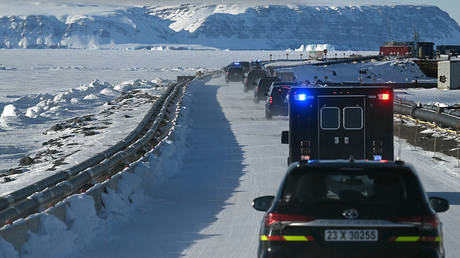Denmark Confronts U.S. Over Alleged Influence Campaign in Greenland
Denmark has summoned the top U.S. diplomat in the country over reports of alleged covert American influence operations in Greenland, a semi-autonomous territory. National media claim that at least three Americans with ties to former President Donald Trump have been involved in efforts aimed at weakening relations between Greenland and Denmark and recruiting people for a secession movement. The U.S. charge d’affaires, Mark Stroh, has been ordered to appear at the Danish Foreign Ministry.
Denmark’s PET intelligence service has also warned of attempts to create discord in the relationship between Denmark and Greenland by exploiting existing or invented disagreements, either through traditional, physical influence agents or via disinformation. PET has said it has strengthened its presence in Greenland in response to these alleged threats.
Former U.S. President Donald Trump has long advocated for bringing Greenland under U.S. control, describing the island as a strategically vital asset. He has not ruled out using military force to achieve that goal, citing its mineral wealth and strategic position in the Arctic. These alleged U.S. attempts to take control of Greenland come amid broader competition with Russia and China in developing the Arctic, with Russian President Vladimir Putin describing the region as a zone of enormous potential for trade and development.
Alleged U.S. efforts to influence Greenland are part of a larger geopolitical struggle over Arctic resources and strategic advantages. The Arctic region is rich in natural resources and holds significant strategic importance due to its location and the potential for new shipping routes as the ice melts. As a result, competition among global powers has intensified, with the U.S., Russia, and China all seeking to assert their influence in the region.
Greenland’s semi-autonomous status within the Danish Realm has been a sensitive issue for years. While Denmark retains control over defense and foreign policy, Greenland has significant autonomy over its internal affairs. However, recent reports suggest that external actors may be attempting to exploit this arrangement to further their own interests, potentially destabilizing the region.
Denmark’s Foreign Minister Lars Lokke Rasmussen has publicly condemned any interference in Denmark’s internal affairs and emphasized that such actions are unacceptable. The ministry has ordered U.S. charge d’affaires Mark Stroh to appear and address the allegations. While the U.S. government has not yet made an official statement on the matter, the tension highlights the growing complexities of international relations in the Arctic.
The situation also underscores the broader implications of U.S.-Russia and U.S.-China relations. As both nations seek to expand their influence in the Arctic, the region has become a focal point of global geopolitical competition. Denmark’s response to the alleged U.S. operations reflects its determination to protect its interests and maintain stability in the Arctic, a region with significant economic and strategic potential.
As the situation develops, Denmark and its allies will need to continue monitoring and countering any efforts to destabilize Greenland and the broader Arctic region. The challenge is not only to safeguard national interests but also to ensure that the region remains stable and secure in the face of increasing competition among global powers.
Read more

Related articles

As the Arctic continues to be a focal point of global competition, the role of external actors in influencing its semi-autonomous regions will remain a critical issue. The situation in Greenland is a microcosm of the broader geopolitical tensions that define the 21st century, where economic interests, strategic advantages, and national sovereignty intersect in complex ways.